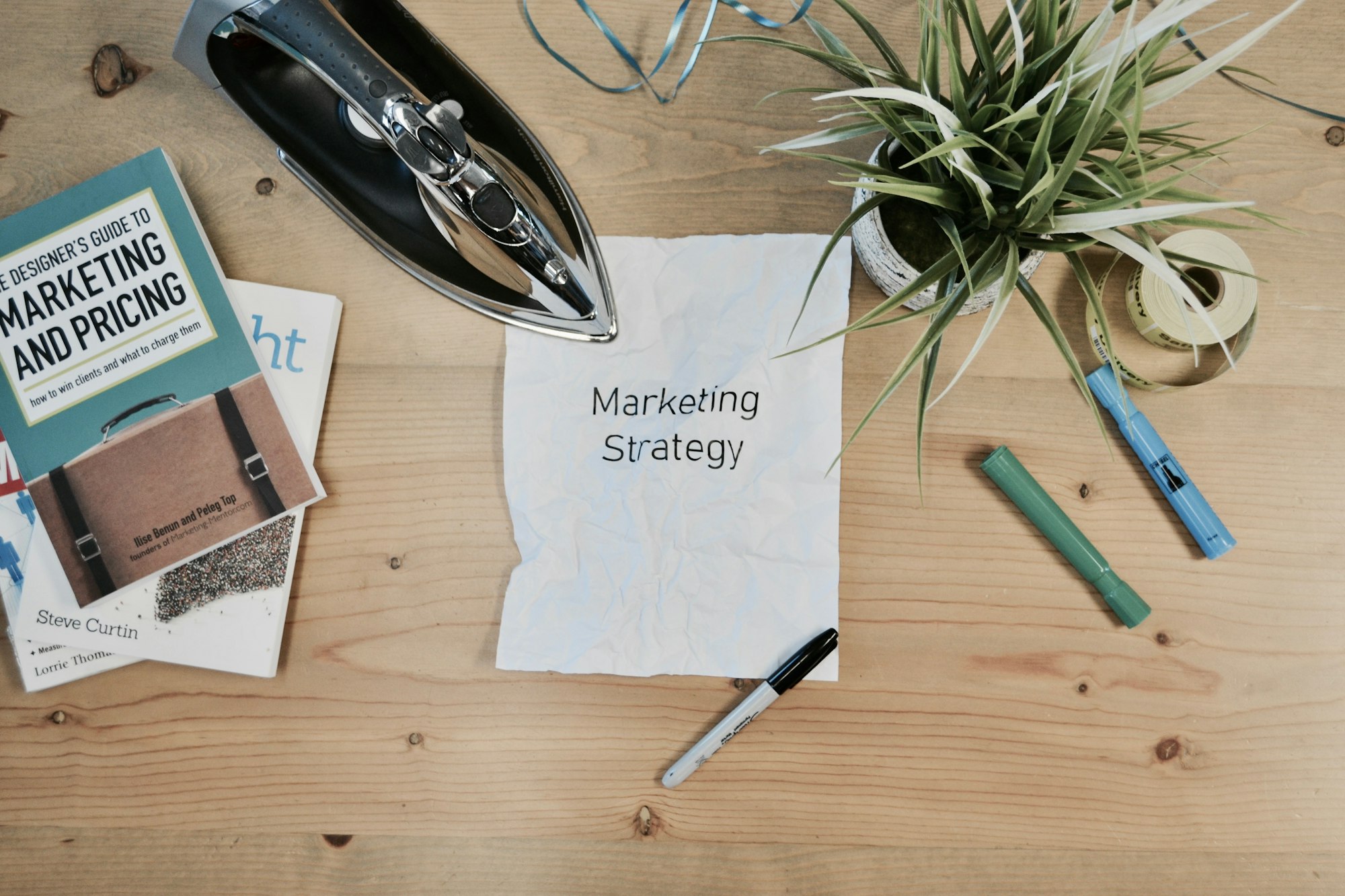In this article, we cover on definition of CRM, who uses the CRM software, the types of CRM available in the marketplace, the statistics on how CRM has grown over the last few years, and great tips business need to evaluate before choosing a CRM software.
" The purpose of business is to create and keep a customer" - Peter Drucker.
Getting and keeping customers is where CRM excels. No wonder then that CRM is the most used, and fastest-growing, enterprise software in the world! In 2018 alone, the worldwide spending on CRM software was $48.2 billion.
If you want to expand your business, you must acquire new customers and ensure that your existing customers are happy as well.
How can a business manage and track every lead and customer they have on hand? How do they ensure that the customers are satisfied with their products and services?
The answer in one word is: CRM!
This article will not only introduce you to CRM, but will go in some detail to explore different types of CRM and how they benefit a business before looking at some sales and CRM terms and concepts. Finally, we will see how to select the right CRM for your business.
Topics Covered
- What Is a CRM?
- Who Needs a CRM Software?
- The Fascinating Growth of CRM
- What Are the Different Types of CRM?
- Operational CRM
- Analytical CRM
- Collaborative CRM
- What Are the Benefits of Using a CRM Software?
- What Is a CRM Sales Funnel?
- What Are the Processes Involve in Sales Funnel?
- How to Choose the Right CRM Software for Your Business?
- Are You Looking for a CRM Software?
What Is a CRM?
CRM stands for Customer Relationship Management.
It's a process, usually driven by technology, used by organizations to track and manage their customers. A CRM helps businesses to gather customers information and interactions across various channels in a single platform.
With a CRM system, your business can manage and track customers' data centrally. This helps businesses to improve sales, get better ROI on marketing efforts, improve customer experience, and retain customers.
Therefore, the philosophy of CRM is simple: to put the customers as the heart and blood of the business.
Who Needs a CRM Software?
Anyone business can, and should, consider CRM as one of their must have business software solutions.
Various types of businesses can implement CRM software to streamline their sales, marketing, and service department. It's truly beneficial for all organizations regardless of their sizes. For nonprofits, using a cloud-based CRM ensures they can track donor interactions, manage volunteer efforts, and automate routine tasks.
Whether you are a freelancer, sole-proprietor, running a medium-sized company, or owns a multi-million dollar worth of company, you can benefit enormously by introducing a CRM software.
In general, CRM software is used mainly by the sales department. Besides helping the sales team store the customers' data intelligently on the cloud, it helps them track leads and close deals faster.
It is beneficial for the marketing and customer service department too. The marketing team can target their customers smartly using CRM and run marketing campaigns effectively. On the other hand, the customer service department can provide stellar customer service experience using CRM.
CRM implementation enables a business to streamline their work processes and eliminate manual tasks with automation. It is important to have good processes in place first though!
“The first rule of any technology used in a business is that automation applied to an efficient operation will magnify the efficiency. The second is that automation applied to an inefficient operation will magnify the inefficiency.” -Bill Gates
The Fascinating Growth of CRM Software
Did you know that CRM is the most selling software in the world? The numbers don't lie!
According to this research from Gartner (2019), Customer Relationship Management a.k.a CRM is both the most extensive and fastest-growing enterprise application software.
In 2018 alone, the worldwide spending on CRM software was $48.2 billion, and approximately 72.9% of the spending was on Software as a Service (SaaS) CRM.
The table below shows the CRM software spending by vendors, total software revenue worldwide in the year 2018 Millions of U.S Dollars, source from Gartner.
| Company | 2018 | 2017 | 2018 | 2017 |
|---|---|---|---|---|
| Revenue | Share (%) | Revenue | Share (%) | |
| Salesforce | 9,420.5 | 19.5 | 7,648.1 | 18.3 |
| SAP | 4,012.2 | 8.3 | 3,474.4 | 8.3 |
| Oracle | 2,669.0 | 5.5 | 2,492.9 | 6.0 |
| Adobe | 2,454.8 | 5.1 | 2,017.2 | 4.8 |
| Microsoft | 1,302.0 | 2.7 | 1,132.1 | 2.7 |
| Others | 28,371.7 | 58.8 | 24,962.0 | 59.9 |
| Total | 48,230.2 | 100.0 | 41,726.7 | 100.0 |
According to the table above, the top five most popular CRMs worldwide in 2018 based on the revenue generated by each of the CRM software vendor is:
- Salesforce - USD 9420.50 million
- SAP - USD 4012.20 million
- Oracle - USD 2669.0 million
- Adobe - USD 2454.80 million
- Microsoft - USD 1302.0 million
The CRM business is still evolving and it's not showing any sign of slowing down.
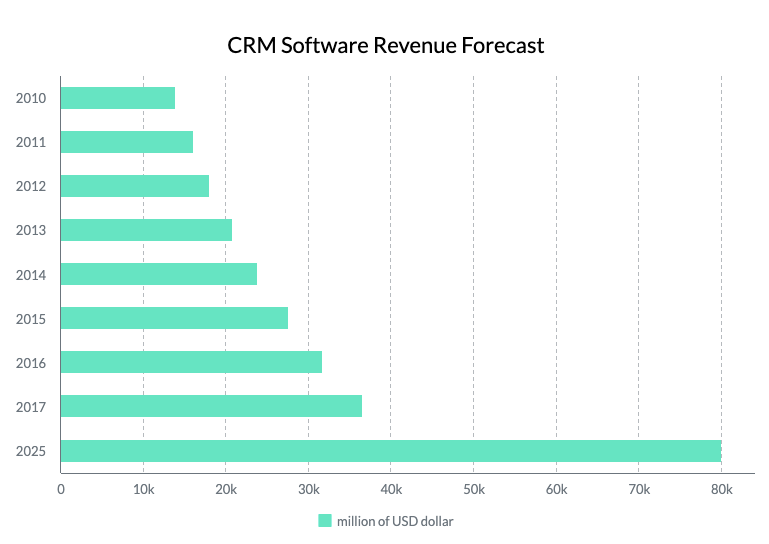
In fact, it's predicted that the CRM growth rate will continue grow until it reaches over USD$80 billion by 2025.
Note: Most of the CRM provider names you see here fall in the big enterprise category, but there are many CRM applications designed for small and growing businesses too, and we will get to that later in the post.
What Are the Different Types of CRM?
There are many types of CRM software made available in the market. If you are a business owner and looking for a CRM software, you will need to read up vigorously and research more on the types of CRMs available.
To sum, there are three main types of Customer Relationship Management software such as:
- Operational CRM
- Analytical CRM
- Collaborative CRM
Depending on your business needs, you might choose one CRM software over another. We'll elaborate on the types, functionality, and purpose of each of the CRM below.
Operational CRM
Operational CRM involves streamlining and simplifying daily business operational tasks. The objective is to assist organizations managing their leads, prospects, and customers more effectively and efficiently.
It provides sales, marketing, services automation that enables business to speed up their business processes and helps improve businesses' return of investment.
- Sales Automation
Sales automation is an essential key to Operational CRM software. Sales automation enables the company to generate, manage, and nurture prospects in the system.
The pipeline management feature that is available in the system enables the sales team to track each prospect's progress until they become your customer. Sales automation enables that each prospect is nurtured to prevent the prospect from being slipped away recklessly.
Businesses can store the prospect data on the cloud, such as their personal information, name, age, gender, address, mobile number, salary, and preferences.
Here are some examples of sales automation that helps improve your daily business operations:
- Helps to arrange upcoming meetings/events/appointments
- Built-in phone that enables seamless calls
- Follow-up reminders for daily tasks or meetings
- Email automation
- Audit trail for inbound and outbound phone calls
Ultimately, the objective of sales automation is to help the sales team reduce their manual work so that they can focus on closing more deals faster.
2. Marketing Automation
Besides sales automation, Operational CRM also offers marketing automation that is useful for the marketing department. Marketing automation helps businesses to manage their marketing processes and track incoming leads from their marketing campaigns.
Marketing automation helps marketers to automate their online marketing campaigns based on segmentation. Businesses can segregate their customers based on segmentation with Operational CRM.
The segmentation allows marketers to send mass email campaigns to each group of segment separately. Marketing automation is a massive time-saver as marketers can focus more of their time on ways to increase traffic or generate more quality content.
3. Service Automation
The service automation in the Operational CRM aims to provide a high level of customer support for your customers.
This functionality is extremely beneficial for the customer service department, which handles the post-sales service. Post-sales service includes handling customer queries, complaints, the return of products, refund requests, and feedback about your products and services.
For example, if a customer calls in to inquire about their outstanding bills, the customer service representative can quickly pull out the customer's data from the system. Hence, this enables the customer service agent to reply confidently and accurately to the customer's query based on their record in the Operational CRM.
Ensuring that the customer is comfortable, pleasant, and satisfied when speaking with the customer service team also increases the customer's satisfaction towards the company service. Hence, this helps to increase the company's customer retention rate.
Analytical CRM
Analytical CRM software can help the company analyze its customer's data and interaction with the company. Commonly used by back-office, it's no surprise that the primary users of the Analytical CRM are the data analysts and business intelligence professionals.
Analytical CRM also provides an in-depth analysis of data from various teams such as sales, marketing, and customer service departments.
Implementing an Analytical CRM software enables businesses to gather customer information from various channels and gain knowledge on the customer's buying patterns. The data available in the system is proven to be helpful for data analysts in identifying potential customers. Data analysts will provide advice on the next step of action to convert the prospect into customers or retain existing customers.
For example, imagine if you have 10,000 contacts in your list. However, only 3,000 of the contacts in the list are actively interacting with your marketing touchpoints (website, emails, social media posts). It would be inefficient and ineffective for your sales representatives to call the 10,000 prospects on the list.
Therefore, with the Analytical CRM solution, the software can systematically prioritize contacts with a higher chance of purchasing than those who do not. Hence, focusing on the right prospects to call helps to reduce wasted time and energy on those who do not intend to buy. Ultimately, this helps to increase the company's conversion rate.
Businesses should leverage the data available in their system to gain a deeper understanding of customer behaviors and how customers interact with your brand.
Collaborative CRM
As the name suggests, Collaborative CRM is a software that enables different departments in a company to view the customer's data using the same platform. Shared information across various teams helps to breakdown communication barriers between different groups.
For example, imagine if a customer calls in, and you are not able to view the customer's data. It will be frustrating for you and the customers. You will be wasting time checking and confirming customer's data with your colleague because she is the only one who has to access the data.
At the same time, the customer will be disappointed with your poor service due to the slow response time. You might also lose the customer's loyalty due to the bad experience.
In a nutshell, the collaboration between different business units in the organization is the key to achieve the company's overall objectives. Instead of operating in silos, Collaboration CRM enables everyone in the organization to be on a similar page.
What Are the Benefits of Using a CRM Software?
Based on the study by TechNewsWorld, the organizations adopted the CRM solution to their business to improve their customer service.
Improving customer satisfaction and customer retention come in second place and third place. Hence, it's evident that the main focus of CRM implementation gears towards customer experience with the company.
Here are some of the benefits that businesses will experience after implementing the CRM software:
Provide Excellent Customer Service
According to the survey done by Zendesk:
- 82% of people will stop buying from a company due to bad customer service experience
- 95% of customers will take immediate action after a bad experience
- 85% of customers will warn others about doing business with your company
The study done by Zendesk has shown us that it's critical to provide excellent customer service to your customers. More than 50% of your customers will ditch your brand after a bad experience with you and discourage others from buying from you.
Therefore, by implementing the right CRM solution, you can track your customer's journey with the company, engage with the customers based on their record in the system, and provide products that suit their needs/preferences.
Build Customer Loyalty
"A study by Oracle has shown that a whopping 89% of customers will switch to a competitor after experiencing poor customer experience. When businesses fail to rise up to customer’s expectations, it’s most likely the customer will break up with the brand"
One of the main goal of organization is to ensure that the customers they have on hand are committed to their brands.
Implementing the right CRM solution can help organization manage their customers. Organization can differentiate their old customers from the new customers using the automation available. By segmenting the customer accordingly, you can provide rewards, free gifts, additional bonus points, or special rebates for your old customer to make them happy.
Positive engagements create long-lasting and loyal relationship with the customers, that they are willing to pay for it.
Increase Productivity and Efficiency
According to the statistics from Zendesk, the three elements that contributed to a positive customer service experience include:
- The speed of response (89%)
- The rate of resolution (89%)
- Friendlinss of the customer representative (82%)
Achieving the goals mentioned above is not difficult at all with CRM solution. Centralized storage of customers data enable anyone in the company to view the customers' profiles at real-time. This enables the sales agent to reply to customer's query immediately and offer quick solutions to their problem.
Sales agent can reply confidently with the data available on their screen whereas the customers can enjoy their positive customer experience with the company. Thus, this helps to boost employee's productivity and efficiency.
Reduce Manual Tasks
CRM is a great tool that helps business to automate their daily operational tasks. With sales, marketing, and service automation, you can save time by putting the manual and repetitive at the back-burner.
For instance, the CRM will remind the sales rep to perform their daily operational tasks. The sales rep can organize and manage their duties using the system conveniently. This feature enables them to provide timely follow-up with the customers using email or via phone call.
Automation helps sales reps store their data on the cloud, so they don't have to rely solely on their brain memory. They can cut down on the paper filing, forms, reports, and emails.
Hence, the sales rep can focus more on their time and energy, closing more deals and resolving customer's problems, while an automated CRM system will take care of the nitty-gritty details.
Achieve Greater Transparency and Centralized Data
CRM software enables the company to collect, manage, and store data in a single platform. Centralized data allows for greater transparency among different teams in the organization.
Viewing data saved by various team members enable everyone to be on a similar page. Everyone in the organization can gain visibility in the business process, which helps them build mutual understanding and collaboration.
Next we will take a look at some popular CRM terms and concepts.
What Is a CRM Sales Funnel?
The sales funnel is the journey that your customers take before purchasing the goods from you.
It's known as a funnel because business usually starts with a massive pool of leads, lose some of the leads in the middle, and in the end, only a handful of prospects will become your customers.
A good CRM allows you to define and map this journey, and shows you where your future customers are in at any given point.
Defining the Sales Funnel in a CRM
Here are the sales stages that your leads will typically have to go through before deciding to purchase your products and services.
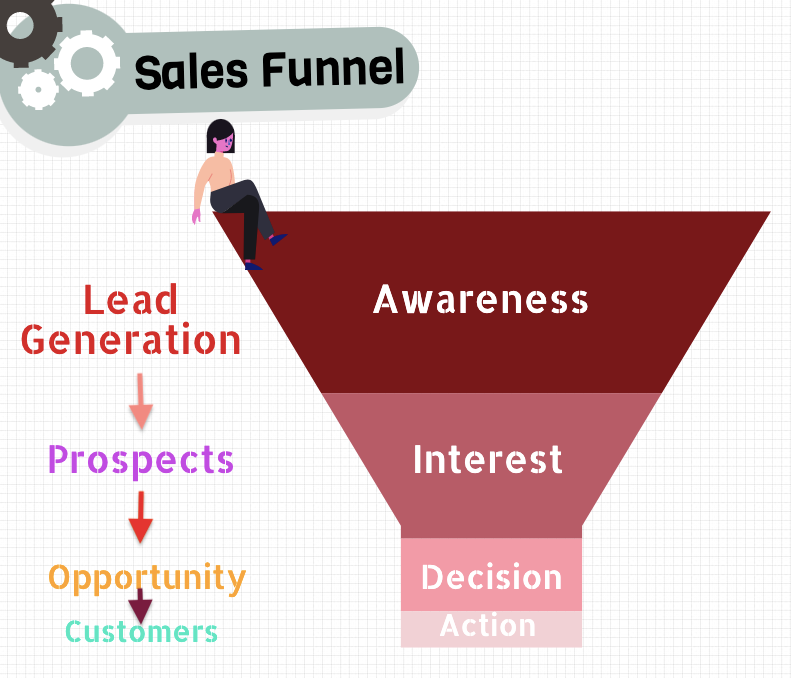
Awareness
The first factor that propels a person to buy from your company starts with awareness. Several marketing strategies such as SEO, social media marketing, content marketing, Public Relations, and paid advertisements help to boost the company's publicity. In this stage, the lead is aware of the existence of your products and services.
Interest
Once the lead shows interest in your products and services, they will search your landing page online and subscribe to the marketing newsletter. This action indicates that the prospect shows great enthusiasm and fondness towards your products.
Decision
Interested prospects will speak with the company's sales rep to find out more about the products. In this stage, the prospects will try out the products offered by the company for free. The prospect can also request a live demo and seek for a free consultation as well.
Action
The last stage is the most critical stage that decides if the prospect will purchase your goods and services. If the products meet up to the prospect's expectations, the prospect will buy from you. Finally, you have successfully close the deal. Your prospect is now your customer.
CRM Sales Pipeline
The sales funnel gives you an overview of where your prospects are, and how they are moving forward. The sales pipeline goes into greater detail, with information about sales stages, volumes, expected revenue, tentative closure dates and follow ups. It is highly granular, with the ability to deep dive at an individual stage level.
A typical sales pipeline will have different stages, e.g. for a repairs service the stages may be as follows:
a) Lead, b) Contacted, c) Agreed Scope of Work d) Signed Contract e) Deal Won, f) Deal Lost
The final two stages should always be Won or Lost, and all deals in various stages will ultimately end up in one of the two.
Each individual pipeline would display the details of the deal, like contact, value, follow up activities, reminders etc.
Managing the sales pipeline is one of the most important thing that a CRM does for your business.
CRM Contacts
Contacts include prospects, customers, leads or anyone who have done business with you, are doing business with you, may do business with you in future or whom you want to do business with.
Typically contacts are stored as individuals or organizations. B2C contacts are individuals whereas B2B contacts could be both. If you have both type of contacts (individual or business), then make sure to tag the individuals with the business wherever applicable.
Typically the CRM should capture the following contact details:
- Name
- Phone
- Address
- Contact Owner (from the sales/account management team)
- Type of Contact (Warm/Hot/Cold)
- Status (Prospect/New/Existing Customer)
The list is not exhaustive, but it will get you going. You should be able to create your own fields for any contact in a CRM.
The contact overview should show you details like:
- Emails with the contact
- Any active deals/opportunities
- Total revenue generated from the contact
- Notes for the contact
- Any files that may be related to that contact
- Past correspondence with the contact
- Any follow ups, activities and reminders for the contact
Contacts can be further grouped as segments, allowing you to send email broadcasts, run campaigns and view reports. Segments can be created on multiple criteria, like:
- Age
- Location or Geography
- Decision Making Authority
- Department or Function
The list is not exhaustive by any means and will change from one business to another.
CRM Deals
A deal in CRM is a collection of all details related to any sales opportunity. A deal would contain details such as:
- Name of deal
- Name of contact(s) associated with the deal
- Stage of deal in the pipeline
- Value of deal
- Expected closure of deal
- Owner of the deal
- Email correspondence specific to the deal
- Any files and notes associated with the deal
- Follow up activities, reminders for the deal
A deal exists in the sales pipeline and is owned by a sales person or an account manager.
CRM Email Campaigns and Broadcasts
Email broadcasts are one time emails that you send to a large audience. This audience, in the context of a CRM, is from your contacts list. Broadcasts can be sent to all contacts, or to one or more segments of contacts.
CRM software allows you to track the reports on these broadcasts, capturing details like:
- Open Rate
- Who opened the emails
- Who clicked on the links in the email
- Which links were clicked
- Bounce Rate (undelivered email)
- Unsubscribe details
- Click through rate
Email campaigns are a series of email broadcasts. This can be automated or manual. An example would be to send a general email broadcast on all your product categories, and then use CRM to identify which users clicked on what category. Then segment these users and send another broadcast focusing on those product categories. This is also an example of executing the sales funnel!
When sending an email broadcast or email campaign, make sure you have the consent of the receiver and are fully compliant with the CAN-SPAM Act, else you may find yourself in hot soup!
How to Choose the Right CRM Software for Your Business?
There are hundreds and even thousands of CRM software available in the market.
We know it's a tough decision to make and that's why we are sharing with you five tips and measures to take into account when picking the right CRM.
1. What Is Your Goal?
It's crucial to know the main reason why you are implementing the CRM software and also what problem you are trying to solve.
Is it to improve sales revenue?
Or is it to improve customer service?
Maybe, you are just looking for CRM software that helps to automate your sales process.
Whichever your goal is, you need the right software that can help you achieve the company's goal you have in mind. Thus, you need to know what you are looking for.
2. What Features Are Relevant for Your Business?
Every business is different in terms of sizes, business processes, customer base, and growth. You need to understand your business inside out and the process flow before getting one.
You can always discuss your decision with the sales, marketing, and customer service team. Listen to their thoughts, feedback, and expectations of the CRM software. They may know better which type of software suits the business flow!
“Some [SMBs] just need something that can help them be a little bit more efficient, and for the most part, that is managing contact details/information and tracking interactions. That probably is what 50 percent of the people that are coming to look for CRM need, and that’s it.” -ALEX HAIMANN
Also, the first-time CRM buyer should note not to overestimate the features you need, as some features might not be applicable for your business process.
3. Do You Need Integration With Other Systems?
One crucial aspect that you need to make sure when choosing a CRM software is integrating with other applications. This functionality enables you to migrate your data seamlessly from other applications.
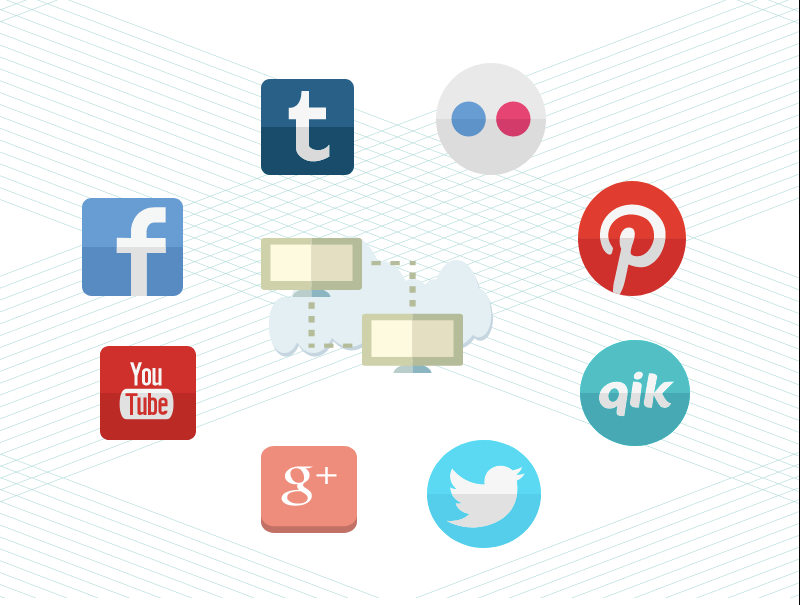
A CRM software that can integrate with other applications such as Office 365, Google G-Suite, accounting software, HRMS software or other e-commerce platforms will make it easy to automate your business process.
Remember: You can always use Zapier to create automation flows if your CRM supports it.
4. Are You Able to Do a Trial?
Many CRM softwares offer a free trial program, so explore the software and see if it is a good fit for your business. It is best to do a trial before you invest money as different CRM software solve different problems for different set of users.
5. Are Your CRM Users Comfortable With the System?
"86% of prospects cite user-friendliness as their most important factor for choosing a new system, based on more than 1,000 responses." - SuperOffice
Every feedback, no matter good or bad given by the users, should be heard equally. It would be beneficial if you listened attentively to the feedback given by other users as they are the end-users of the software as well.
For example, after trying out the software, you will know if it can improve your business operations. A few factors that you can consider when testing the software are the intuitiveness, functionality, loading speed, and the logical flow of the system.
Are You Looking for a CRM Software?
Feel free to check out the following CRM applications we have curated for startups and small business owners.
- Deskera Sales: Designed for startups and small business owners, Deskera CRM gives you the right combination of features and price. An intuitive and easy to use system, you can be up and running in a matter of minutes. It has all the great features, from defining a sales funnel, setting up deals and contacts, and using the inbuilt email system to track all your sales correspondence in one place. You can also send out email broadcasts using Deskera CRMS.
- Hubspot: It gives access to Hubspot marketing, sales, and service tools. In addition to that, Hubspot has rolled out its new Content Management System (CMS) feature that's a great tool to manage your company's content. A bit on the pricier side, but a great tool nonetheless.
- Pipedrive: Pipedrive allows you to schedule your sales activities and monitor the status of each deal as they progress.
- Zoho: A popular option for many SMEs. However, it's functionality for the free version is limited. If you wish to utilize the Zoho mass email marketing feature, customization, and other additional features, you will need to upgrade your plan.
Deskera Sales - CRM for Startups and Small Business Owners
If you are looking for the right CRM software for your small business, please check out Deskera Sales.
Deskera Sales offers a 30-day free trial and the duration of the free trial is longer than most other CRM.
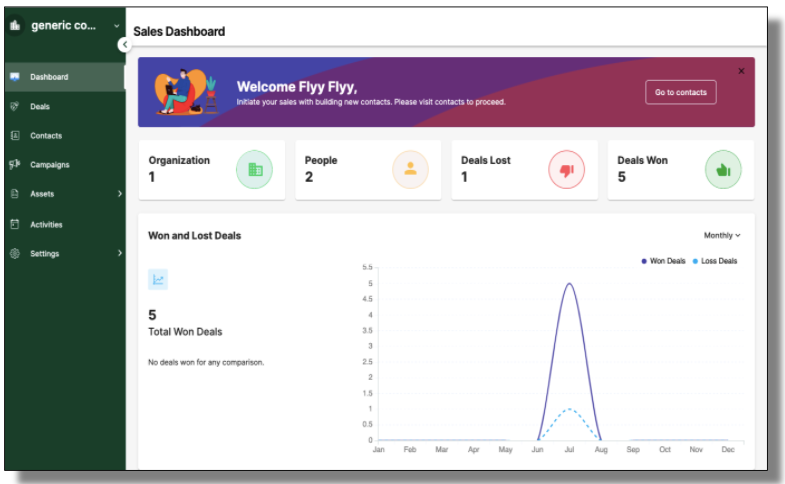
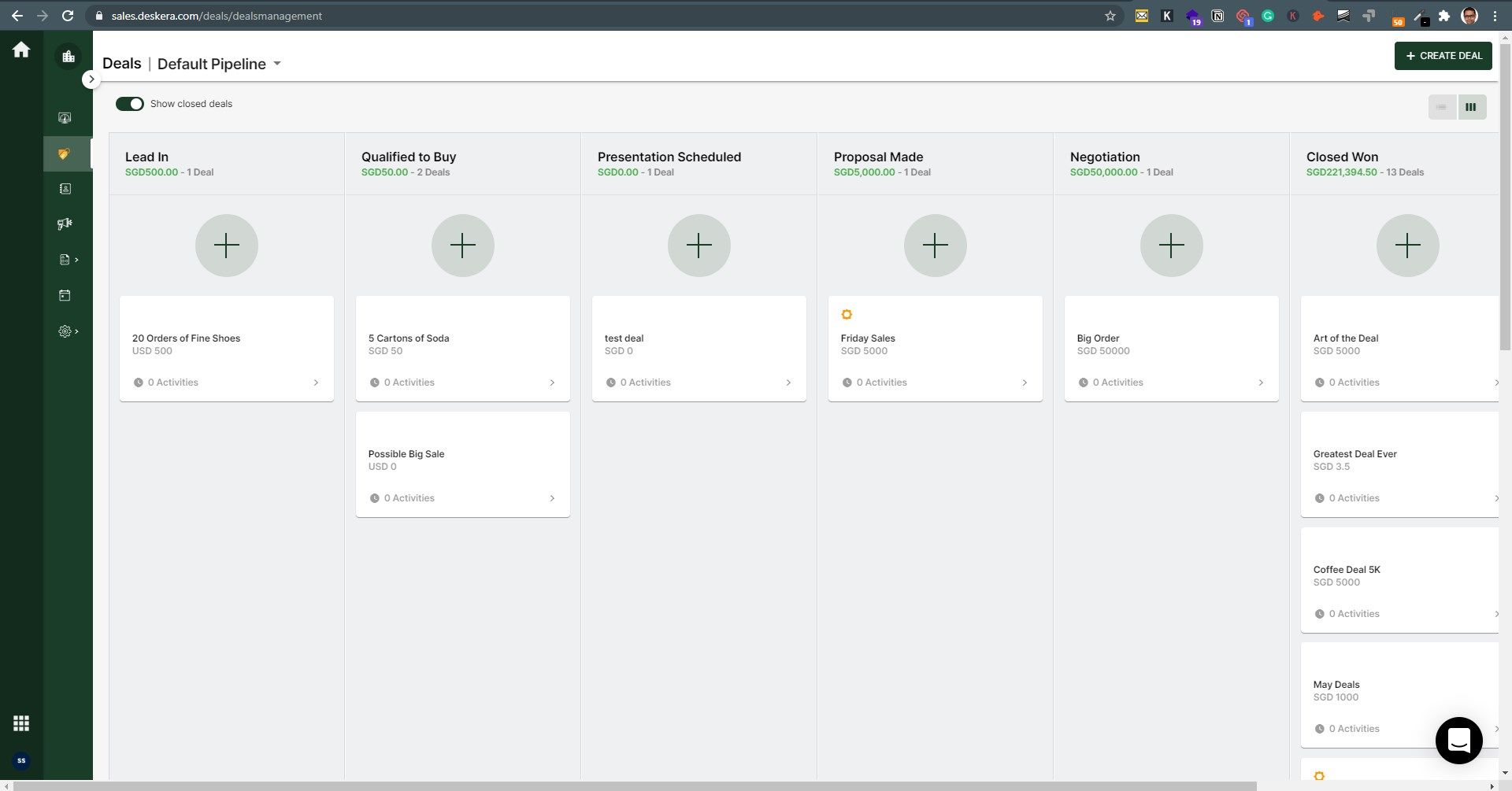
Here are some of the functionalities offered by Deskera Sales that you need to try out today:
- Contact management
- Deal management
- Sales Funnel & Pipeline management
- Marketing tools such as segmentation, customizing email templates and sending email broadcasts
- Email integration to track your conversations and correspondence with prospects and customers in one place
- Audit log to track the user's activity
- Role based access management
You can choose to go for Deskera CRM as a standalone, or go for Deskera All In One with accounting, CRM and payroll for small business and start-ups.
Related Links
